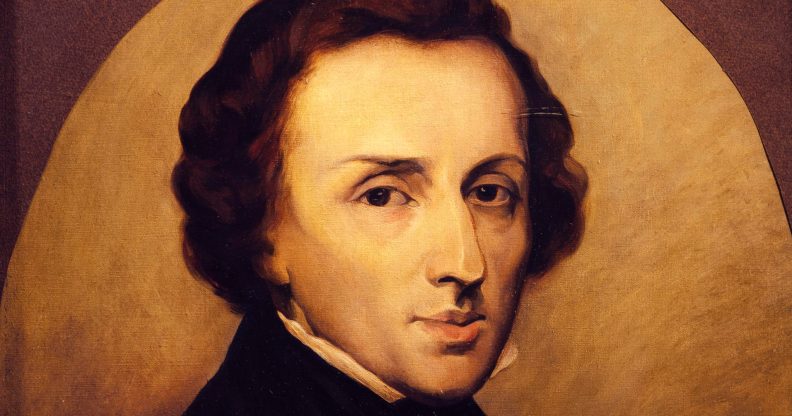Desperate Poles claim legendary Polish composer Frédéric Chopin wasn’t really gay, only ‘musical and complicated’

Portrait of Frederic Chopin by Zelazowa Wola, 1849.(DeAgostini/Getty)
The news of Frédéric Chopin’s homoerotic love letters hasn’t gone down well in his homophobic homeland, where historians desperately insist he was merely “complicated”.
The legendary composer’s hidden sexuality was explored last week in the radio show Chopin’s Men, in which Swiss music journalist Moritz Weber revealed he’d discovered a “flood of declarations of love aimed at men”.
There are 22 erotically-charged letters on record from Chopin to his friend, Tytus Woyciechowski, whom he addresses as “my dearest life”, and signs off with: “Give me a kiss, dearest lover.”
In one he wrote: “You don’t like being kissed. Please allow me to do so today. You have to pay for the dirty dream I had about you last night.”
Weber argued that Chopin’s letters were intentionally mistranslated, with rumours of affairs with women exaggerated and hints at an apparent interest in “cottaging” simply ignored. He also found that subsequent biographies swap male pronouns to female ones and downplay any evidence of Chopin’s relationships with men.
This didn’t go down well in Poland, where a third of the nation has declared itself “LGBT-free” amid a rising tide of anti-gay sentiment.
Chopin remains an icon in the country of his birth nearly two centuries after his death, and his name adorns parks, streets, benches and buildings. Many Poles weren’t prepared to accept the possibility that the musical genius was anything other than straight.
“Was Chopin gay?” several panicked Polish papers have asked in recent days. “Chopin kisses his friend. Does that mean he was gay?” one publication questioned, suggesting Weber was “falsifying reality”.
Weber’s convincing argument was countered by a spokesperson for the Fryderyk Chopin Institute in Warsaw, Poland, who insisted that the homoerotic language was simply a product of the Romantic era and Chopin’s educated social circle.
“If you read [the letters] in the Polish original, it sounds a little bit different,” he said. “The way Chopin uses language is so musical and complicated, to translate all that is madness.”
Rose Cholmondeley, the president of the UK’s Chopin Society, hesitated to confirm whether Chopin was gay but remained open to the possibility.
“He is a symbol of Poland, but you’ve got a government now which is absolutely anti-gay – and were he to be gay, God knows what they would make of it,” she told CNN. “When somebody’s an icon, an awful lot of things are suppressed.”

